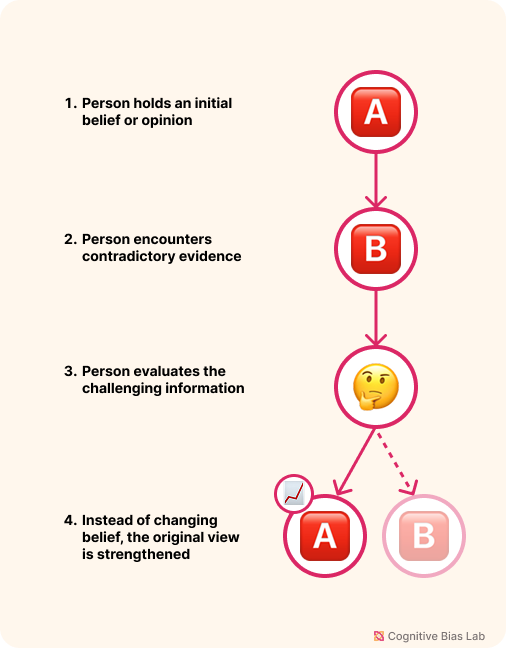Backfire Effect
Your progress on this bias test won't be saved after you close your browser.
Understanding Backfire Effect
Backfire Effect
When presented with evidence that contradicts our beliefs, we often reject it and strengthen our original position. This cognitive response transforms corrections into reinforcement of misinformation.
Overview
Backfire effect occurs when contradictory evidence causes people to strengthen their existing beliefs rather than revise them. This cognitive bias demonstrates how our minds actively resist information that challenges our worldview, often leading us to double down on incorrect positions despite clear evidence to the contrary.
Key Points:
- The backfire effect is most powerful when challenging deeply held beliefs or core aspects of personal identity
- It operates as a form of cognitive dissonance resolution, where rejecting new information feels easier than updating beliefs
- The effect is particularly strong with political and ideological convictions where emotional investment is high
- Digital media environments can amplify this bias by creating echo chambers that rarely expose us to challenging viewpoints
Impact: The backfire effect profoundly influences public discourse and decision-making. It contributes to political polarization, makes correcting misinformation extremely difficult, and can perpetuate harmful beliefs despite educational efforts. Rather than creating more informed citizens, presenting contradictory facts to someone experiencing this bias may actually reinforce misconceptions.
Practical Importance: Understanding the backfire effect is essential for effective communication, education, and persuasion. By recognizing how our minds instinctively reject challenging information, we can develop better approaches to updating beliefs based on evidence rather than entrenchment. This awareness helps us become more intellectually flexible and receptive to correction in our own thinking.

Visual representation of Backfire Effect (click to enlarge)
Examples of Backfire Effect
Here are some real-world examples that demonstrate how this bias affects our thinking:
Vaccine Misinformation Persistence
A parent who believes vaccines cause autism encounters a comprehensive scientific study disproving this link. Instead of reconsidering their position, they become more convinced of their original belief, arguing that the study must be compromised by pharmaceutical companies. They subsequently join anti-vaccine groups and share more misinformation online, demonstrating how contradictory evidence strengthened rather than weakened their incorrect belief.
Political Fact-Checking Paradox
During an election, independent fact-checkers identify 32 false statements made by a politician. When these corrections are shared with the politician's supporters, many react by becoming even more supportive of the candidate. They perceive the fact-checking as a biased attack from political opponents rather than legitimate correction. Polls show their trust in the candidate increased by 12% after seeing the corrections, illustrating how contradictory information reinforced rather than undermined their existing beliefs.
How to Overcome Backfire Effect
Here are strategies to help you recognize and overcome this bias:
Use Self-Affirmation
Reflect on your core values before confronting opposing views to reduce defensiveness and stay open to new evidence.
Shift to Truth-Seeking Mindset
Focus on understanding, not winning. Ask others to explain their views and explore the facts together to avoid defensive reactions.
Test Your Understanding
Challenge yourself with these questions to see how well you understand this cognitive bias:
A climate scientist notices that after presenting data showing global temperature trends to skeptical audiences, many attendees express even stronger doubts about climate change than before. What approach would most effectively address this situation?
Academic References
- Swire-Thompson, B., DeGutis, J., & Lazer, D. (2020). Searching for the backfire effect: Measurement and design considerations. Journal of Applied Research in Memory and Cognition, 9(3), 286–299.
- Swire-Thompson, B., Miklaucic, N., Wihbey, J. P., Lazer, D., & DeGutis, J. (2022). The backfire effect after correcting misinformation is strongly associated with reliability. Journal of Experimental Psychology General, 151(7), 1655–1665.
- Wood, T., & Porter, E. (2016). The elusive backfire effect: mass attitudes’ steadfast factual adherence. SSRN Electronic Journal.